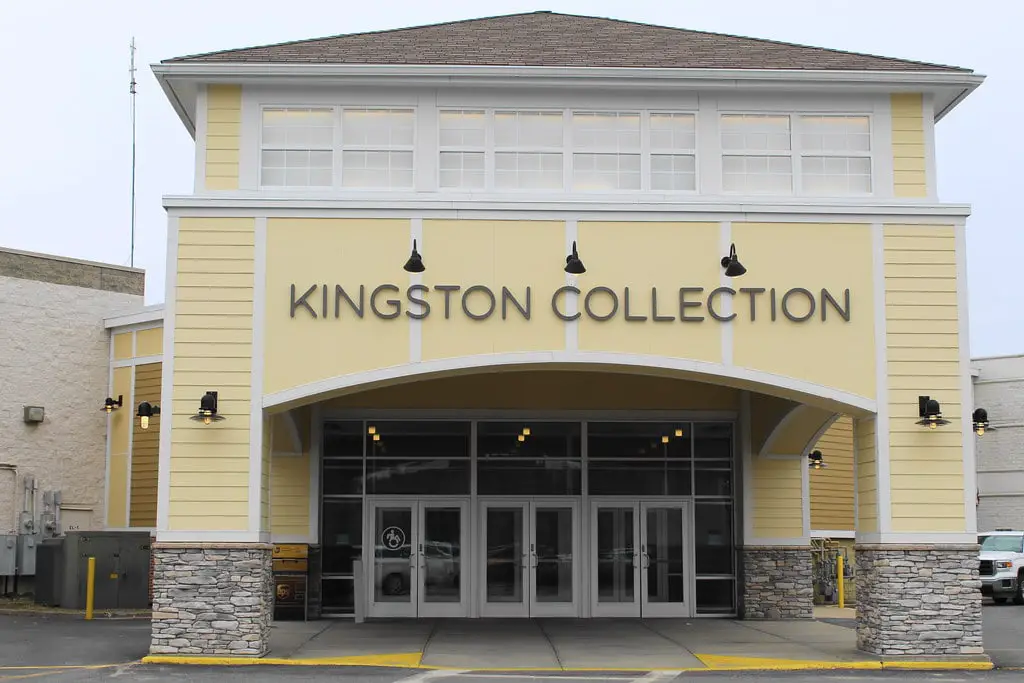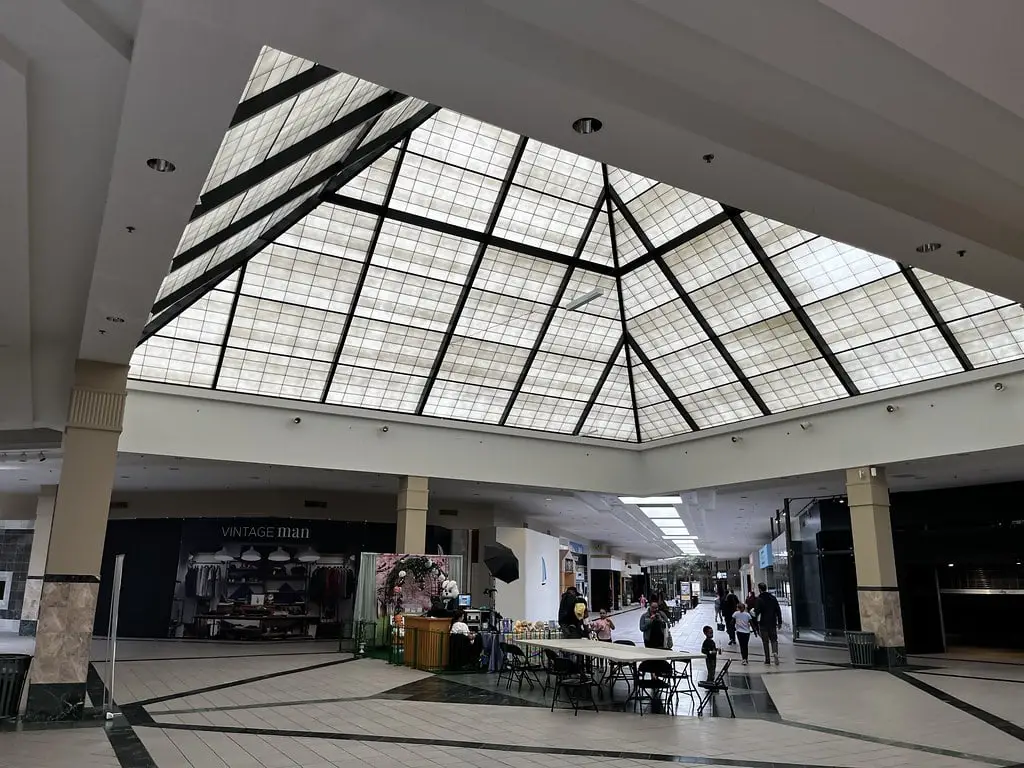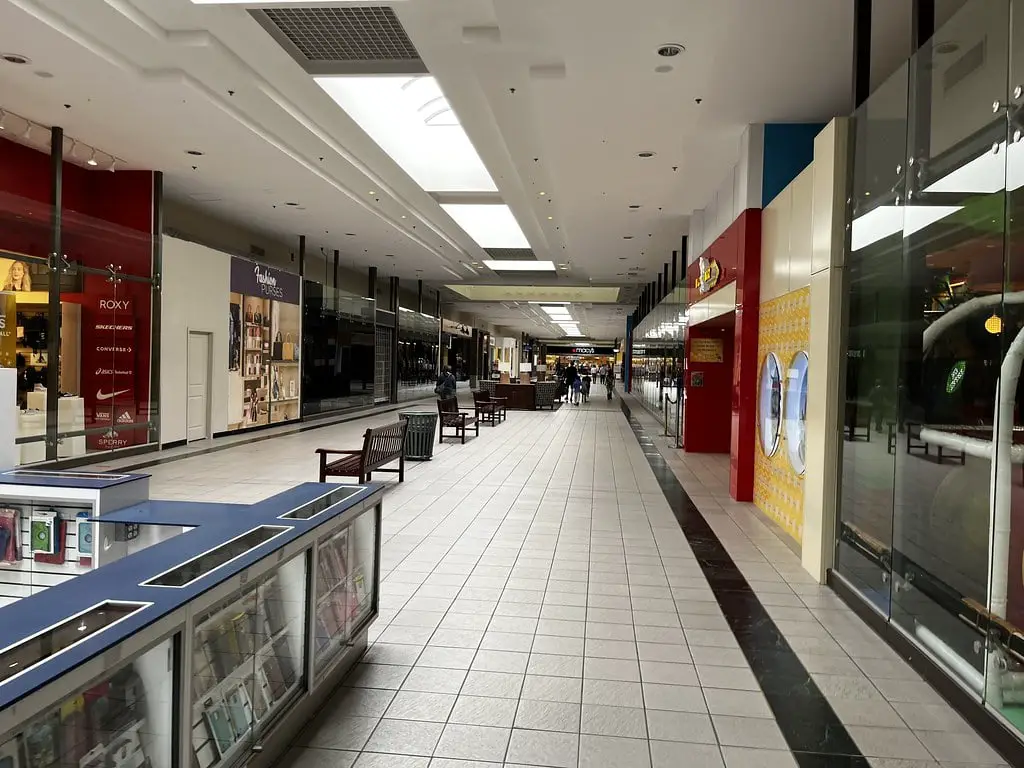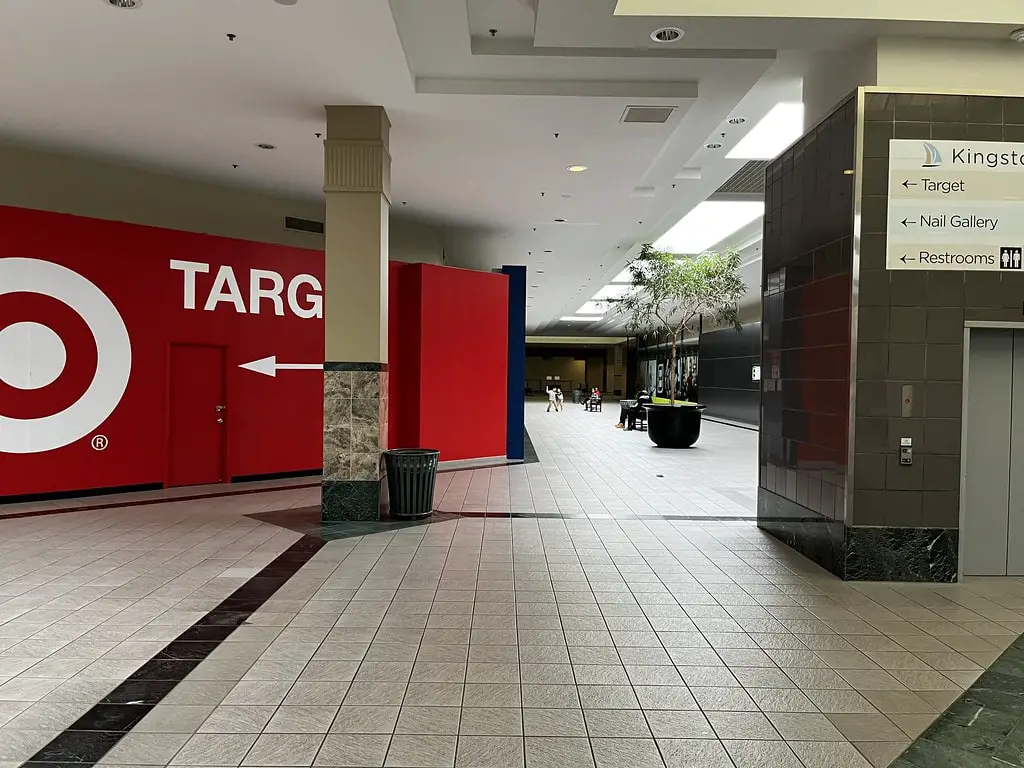The Birth of a Shopping Destination
In 1989, a vision transformed into reality between Kingston and Plymouth, Massachusetts, with the opening of the Independence Mall, later rebranded as the Kingston Collection Mall.
This sprawling one-story enclosure, developed by The Pyramid Companies, was more than just a mall; it was a beacon of retail innovation and community gathering.
Anchoring this new retail haven were giants of the shopping world: Sears, JCPenney, Filene’s, Filene’s Basement, and Hoyts Cinema. Each name brought its unique allure, drawing crowds eager for a blend of fashion, convenience, and entertainment.
The mall’s opening and excitement in the South Shore region created a buzz. It was as if Kingston had been marked on the map with bright, indelible ink.
The mall’s design and selection of stores and services spoke volumes about its ambition to be more than a mere shopping location; it aimed to be a center of community life. With over 837,000 square feet of retail space, it offered an extensive variety of options for shoppers of all ages and interests.
Over the years, the mall’s influence grew, mirroring its visitors’ changing tastes and shopping habits. The initial lineup of anchor stores was a testament to the era’s retail giants, offering everything from high-end fashion to household goods and electronics.
This diversity catered to various consumer needs and positioned the Kingston Collection as a comprehensive shopping and leisure destination.
The inclusion of Hoyts Cinema, for instance, added a significant entertainment component, turning the mall into a place where people could shop, dine, and enjoy the latest movies all under one roof.
It’s no wonder that, for many, the Kingston Collection became synonymous with things to do near Plymouth, MA.
A Grand Vision for Renewal
Construction began in December 2011 on the new 58,000 sq ft Regal Cinemas 14 complex, which will take the site of the old Hoyts Cinema.
2013 marked a pivotal moment for the Kingston Collection, as management unveiled ambitious plans for a comprehensive makeover. The vision was clear: transform the mall into a modern retail, entertainment, and dining powerhouse.
This renovation wasn’t just about sprucing up the façade or adding a fresh coat of paint. It involved a radical reimagining of the mall’s design and offerings.
The proposed exterior updates aimed to make the mall more inviting, while interior enhancements, including new tile work, updated paint schemes, and renovated restrooms, promised a more pleasant shopping experience.
Key to this vision was the expansion of the mall’s offerings. The introduction of plush seating areas with free WiFi, alongside an array of new stores and dining options, signaled a shift towards creating a more inclusive and engaging environment.
The goal was to cater to a broader audience, from tech-savvy teens to families looking for a day out.
The renovation plans also included the strategic reopening and renovation of the basement area, which had been closed to the public since 1998 and was set to house new attractions like the F-100 indoor racetrack and K1 Speed. This move was intriguing, blending retail with high-octane entertainment to attract crowds.

Challenges and Setbacks
Despite the grand plans for renewal, the Kingston Collection’s journey was not without its hurdles. A significant challenge emerged on November 11, 2014, when a Tier2 HazMat situation led to the mall’s evacuation.
The incident, sparked by a strange odor in the food court, caused quite a stir. Customers, including those in the cinema, were evacuated, and emergency services were required to intervene.
This event raised questions about safety and emergency preparedness, casting a shadow over the mall’s attempts to rejuvenate its image.
Another blow came with the announcement on October 23, 2014, that Sears would be closing its doors as part of a broader strategy to shut down 77 stores nationwide.
The loss of Sears in January 2015 was more than just the store closure; it represented the end of an era for the Kingston Collection.
Sears had been a cornerstone of the mall, and its departure underscored the challenges faced by traditional retail in an increasingly digital marketplace.
These setbacks highlighted the retail industry’s unpredictable nature and the need for malls like the Kingston Collection to adapt swiftly to changing circumstances.
While the renovation and rebranding efforts aimed to reposition the mall for the future, these challenges reminded us of the complexities involved in revitalizing such a large retail space.

Adapting to Modern Retail Trends
A pivotal moment was the demolition of the former Sears building and the construction of The Point at Kingston, a high-end apartment complex on the mall’s premises.
This development, which opened in 2022, was emblematic of a trend to blend residential living with retail environments, offering rents ranging from almost $2,200 to more than $4,800.
Integrating residential spaces within the mall’s footprint was a strategic move designed to create a self-contained community where people could live, shop, and enjoy entertainment all in one place.
This concept of a mixed-use development wasn’t just about diversifying the mall’s appeal; it was about reimagining the mall as a holistic lifestyle destination.
The presence of high-end apartments alongside retail and entertainment options reflected an approach to mall design that could draw in a new demographic and revive interest in the mall.
The Point at Kingston development was a bold statement in the face of the challenges that have beset traditional malls nationwide.
The Kingston Collection signaled its adaptability to consumers’ changing demands and the retail industry’s shifting dynamics by repurposing part of the mall’s real estate for residential use.
The Transition of Ownership
In July 2023, the Kingston Collection embarked on a new chapter under the stewardship of Second Horizon Capital. This Florida-based firm purchased the mall for $9 million.
The sale was a clear signal of changing times. Second Horizon Capital voices ambitious plans to rejuvenate the mall.
Their vision includes reenergizing on-site activity and leveraging the existing infrastructure to enhance the overall experience for guests and tenants alike.
This strategic shift in ownership marked a significant pivot towards revitalizing the mall’s prospects, aiming to reposition it as a vibrant community hub.

The acquisition by Second Horizon Capital wasn’t just about changing management; it was about adopting a fresh perspective on what the Kingston Collection could offer.
With a keen eye on the “attractive economic environment in Plymouth County,” the new owners saw potential where others saw challenges.
This optimism is crucial, reflecting a belief in the mall’s capacity to evolve and thrive amid a rapidly changing retail landscape.
Another critical move was the management transition to Spinoso Real Estate Group. With expertise in real estate and a track record of revitalizing commercial spaces, Spinoso is poised to steer the Kingston Collection toward a brighter, more prosperous future.
This transition period underscores a broader trend in the retail industry, where adaptability and innovative management practices become key drivers of success.
Echoes of the Past: Famous Stores within Kingston Collection
As the Kingston Collection Mall traverses through its quieter days, it’s reminiscent of reflecting on the famous stores and experiences that once brought life and energy to its spaces.
Even as a mall is currently considered “dead” in the traditional retail sense, the presence of key tenants and the memory of bustling activity paint a complex picture of transition and change.
Anchors and Legacy Tenants
Macy’s and Target stand as notable anchors, serving as beacons that still draw visitors for their wide-ranging merchandise and reliability. These anchors, alongside a selection of enduring tenants, offer glimpses into the mall’s more vibrant past.

Specialty Stores and Entertainment Venues
Maziply Toys and Newbury Comics are symbols of specialty retail, offering unique products, from toys and games to comics and pop culture merchandise.
Their continued operation provides a sense of nostalgia and individuality amidst the changing retail landscape.
LensCrafters and Pearle Vision offer specialized services catering to the essential eye care needs of the community. Despite the mall’s quieter ambiance, the necessity for personal services sustains their presence.
Entertainment options like Regal Cinema for moviegoers, Sky Zone Trampoline Park for active fun, and Maziply’s Laser Tag, Mirror Maze, and Zoo Rides recall when the mall was a family fun and excitement destination, providing interactive experiences that drew crowds of all ages.
Reflections on Resilience and Community
The Kingston Collection’s journey from a bustling center of commerce to its current state reflects broader shifts in the retail industry and consumer habits.
The presence of these famous stores amidst many vacancies speaks to the resilience and hope for renewal.
The mall’s transformation into a “dead mall” does not erase the memories of its peak days but instead highlights the need for adaptation and innovation in the face of change.
As we look at the Kingston Collection today, it’s important to remember how such spaces have brought together communities.
The challenge lies in reimagining these spaces to serve new purposes, potentially blending retail with community services, entertainment, or residential living to breathe new life into the expansive halls that once thrived with shoppers and families.
